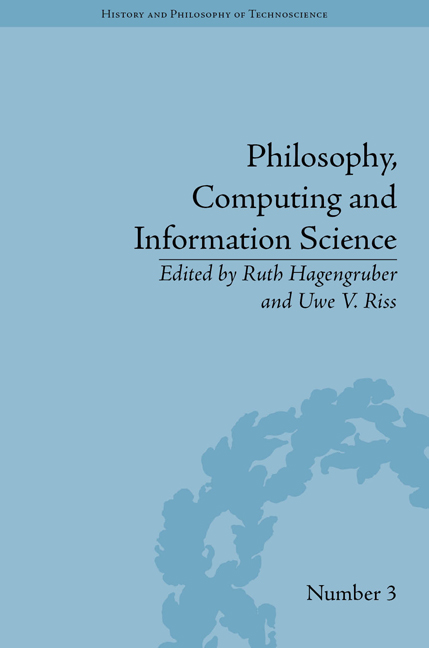Book contents
- Frontmatter
- CONTENTS
- List of Contributors
- List of Figures and Tables
- Introduction: Philosophy's Relevance in Computing and Information Science
- Part I Philosophy of Computing and Information
- Part II Complexity and System Theory
- Part III Ontology
- Part IV Knowledge Representation
- Part V Action Theory
- 13 Knowledge and Action between Abstraction and Concretion
- 14 Action-Directing Construction of Reality in Product Creation Using Social Software: Employing Philosophy to Solve Real-World Problems
- 15 An Action-Theory-Based Treatment of Temporal Individuals
- 16 Four Rules for Classifying Social Entities
- Part VI Info-Computationalism
- Part VII Ethics
- Notes
- Index
13 - Knowledge and Action between Abstraction and Concretion
from Part V - Action Theory
- Frontmatter
- CONTENTS
- List of Contributors
- List of Figures and Tables
- Introduction: Philosophy's Relevance in Computing and Information Science
- Part I Philosophy of Computing and Information
- Part II Complexity and System Theory
- Part III Ontology
- Part IV Knowledge Representation
- Part V Action Theory
- 13 Knowledge and Action between Abstraction and Concretion
- 14 Action-Directing Construction of Reality in Product Creation Using Social Software: Employing Philosophy to Solve Real-World Problems
- 15 An Action-Theory-Based Treatment of Temporal Individuals
- 16 Four Rules for Classifying Social Entities
- Part VI Info-Computationalism
- Part VII Ethics
- Notes
- Index
Summary
Introduction
The management of knowledge is considered to be one of the most important factors in economic growth today. However, the question of how to deal with knowledge in the most efficient way is still far from answered. We observe two fundamentally different approaches to the question of how we should deal with knowledge. One view sees knowledge as a kind of static object that can be gathered, compiled and distributed; the other view regards knowledge as a dynamic process. This disaccord finds a parallel in an objective–subjective distinction where the first position sees knowledge as independent of personal opinion whereas the second position regards it as interpretative. These discussions are not merely academic but crucially influence the way that knowledge management (KM) is realized, i.e. whether the focus is placed on knowledge artefacts such as documents or on subjective acts.
The particular interest of the current essay concerns the question of how KM can be supported by information technology (IT) and which are the fundamental structures that must be regarded. Traditionally, IT-based approaches favour an object-oriented view of knowledge since knowledge artefacts are the objects that can be best processed by IT systems. This even leads to the view that knowledge artefacts represent the only form of knowledge. On the philosophical side this perspective is fostered by analytical investigations that emphasize the primacy of propositional knowledge that is closely related to knowledge artefacts.
- Type
- Chapter
- Information
- Philosophy, Computing and Information Science , pp. 145 - 168Publisher: Pickering & ChattoFirst published in: 2014



